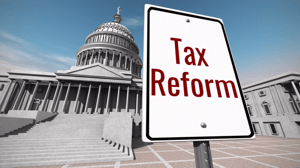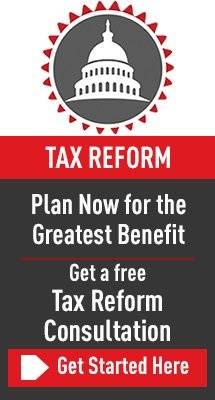 No matter the type of business you own, the new federal tax reform act offers benefits – many of them significant.
No matter the type of business you own, the new federal tax reform act offers benefits – many of them significant.
Much has been made about the major tax rate reduction for C Corporations. It’s without a doubt a big tax break for C Corps, but it’s far from the only substantial benefit for businesses.
For small businesses – specifically pass-through entities – the new 20% Qualified Business Income Deduction (QBI) is likely one of the biggest tax benefit in more than 60 years. Read on to learn more about QBI and several other new or changed business deduction provisions under the 2017 Tax Cuts and Jobs Act:
Qualified Business Income Deduction
This new major benefit for owners of pass-through entities shelters taxable income that would otherwise be taxed as ordinary income, which is subject to the marginal individual tax rates. And as with many IRS rules, the bigger the tax benefit, the more complicated the qualifications.
In a nutshell, the deduction allows a qualified small business owner to simply not pay income taxes on 20% of their income in tax years 2018 through 2026. Restrictions kick-in to reduce the benefit when a taxpayer’s income rises and there are a different set of qualifications for so-called service businesses, including doctors, lawyers, accountants, performing arts, athletics, financial and brokerage services.
The calculation is complicated but worth undertaking to obtain the maximum benefit. We can determine if you qualify for the deduction and can make suggestions on steps to take to increase your benefit. You can learn more about the new QBI deduction here.
Both Bonus depreciation and the Section 179 expensing election were greatly increased in the act. Both methods can be used to accelerate write-offs of business asset purchases, including qualified building improvements, computer systems, vehicles, machinery, equipment, office furniture and so forth.
First year Bonus Depreciation was increased from 50% to 100% and can now be taken for both new and used qualifying property through 2022. For Section 179 expensing election, the maximum deduction was increased from $510,000 to $1 million with the phase-out threshold increased from $2.03 million to $2.5 million. Read more about equipment depreciation changes here.
READ MORE: Your Complete Tax Reform Guide for Businesses, Individuals
Domestic Productions Activities Deduction (DPAD)
The tax reform act was not all good news for businesses that took advantage of the DPAD. DPAD had allowed businesses that manufacture or produce products in the U.S. to take a 9% deduction of qualified production activity income. The DPAD was repealed as of Jan. 1, 2018.
Net Operating Losses
This is another loss for businesses who use Net Operating Loss deductions to their advantage. For 2018 and beyond, the maximum amount of taxable income you can offset with NOL deductions will only be 80% instead of 100%. You can no longer carry-back NOL deductions, but you can now carry them forward indefinitely.
While some of the most significant, these are far from the only major changes the impact businesses. The Tax Cuts and Jobs Act was the most sweeping tax reform in 30 years – the changes are numerous and it’s best to consult us on how the changes will affect you and how to plan to take advantage of the changes for your benefit.






